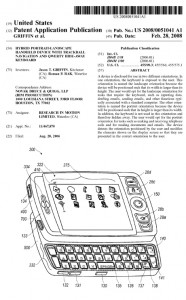There are very few things people have heard more, but know less, about than patents. Nearly every infomercial touts its product as “patented” or “patent pending,” but what does that mean? Are patents easy to get? If you change 25 percent of the invention, can you avoid infringing a patent? When is a patent “pending”?

Misinformation abounds when it comes to patents. While facts about patents would fill volumes, here are few interesting facts about patents you can use to regale your geeky relatives over the holidays:
10. You can keyword search millions of patents on Google Patent Search for free.
9. Patents expire 20 years after you file your application. Patent terms used to be 17 years from the date the patent issued. Some inventors, however, were intentionally dragging their feet, waiting until someone else brought their technology to market before having their submarine patents issue. Now, if you drag your feet for 19 years, your patent will only be valid for 1 year.
8. You must pay the Patent Office “maintenance fees” to keep your patents in force. Failure to pay these fees due at three and a half, seven and a half, and eleven and a half years from the date the patent is granted will cause your patent to become abandoned.
7. No patent search is 100 percent effective. Even if you searched all 7 million plus patents, patent applications are kept confidential for at least 18 months after filing. Theoretically someone else’s patent could issue on your invention the day after your searched every published patent and patent application.
6. On average, your patent application will be pending nearly three years. This is not all bad though. Although you enforcement rights are severely limited while the patent is pending, having a competitor build up a demand for your product before the patent issues can be a very profitable turn of events.
5. There is no such thing as a “Poor Man’s Patent.” Relying on a letter you mailed yourself to protect your invention actually provides no protection whatsoever.
4. Just because you have a patent, does not necessarily mean your invention is valuable. Inventors have succeeded in obtaining patents on some pretty wacky inventions.
3. If your invention cannot be “reverse engineered” a trade secret may be a cheaper, easier and longer lasting alternative to a patent.
2. Ordinary attorneys are not allowed to draft patents for clients. To become a patent attorney, you have to have an undergraduate degree in a science, or the equivalent, and have passed the notoriously challenging patent bar exam. No two patents, or patent attorneys, are created equal. It would be extremely unlikely two patent attorneys would draft identical patent applications covering a given
invention. The patent attorney’s experience, and skill and knowledge of the field of art, all factor into whether the patent will be broad and enforceable or narrow and easily invalidated.
1. A patent does not give you the right to make your invention. Your patent merely gives you the right to prevent others from making your invention. The United States Patent and Trademark Office will grant patents on inventions which are improvements on other patented inventions. A patent in hand notwithstanding, if your invention infringes on a valid patent, you cannot make your invention absent a license agreement from the other patent holder.





Recent Comments